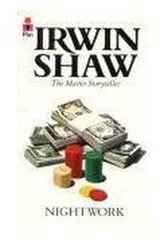Irwin Shaw - Short Stories - Five Decades
Здесь есть возможность читать онлайн «Irwin Shaw - Short Stories - Five Decades» весь текст электронной книги совершенно бесплатно (целиком полную версию без сокращений). В некоторых случаях можно слушать аудио, скачать через торрент в формате fb2 и присутствует краткое содержание. Год выпуска: 2013, Издательство: Open Road Media, Жанр: Современная проза, на английском языке. Описание произведения, (предисловие) а так же отзывы посетителей доступны на портале библиотеки ЛибКат.
- Название:Short Stories: Five Decades
- Автор:
- Издательство:Open Road Media
- Жанр:
- Год:2013
- ISBN:нет данных
- Рейтинг книги:5 / 5. Голосов: 1
-
Избранное:Добавить в избранное
- Отзывы:
-
Ваша оценка:
- 100
- 1
- 2
- 3
- 4
- 5
Short Stories: Five Decades: краткое содержание, описание и аннотация
Предлагаем к чтению аннотацию, описание, краткое содержание или предисловие (зависит от того, что написал сам автор книги «Short Stories: Five Decades»). Если вы не нашли необходимую информацию о книге — напишите в комментариях, мы постараемся отыскать её.
Short Stories: Five Decades — читать онлайн бесплатно полную книгу (весь текст) целиком
Ниже представлен текст книги, разбитый по страницам. Система сохранения места последней прочитанной страницы, позволяет с удобством читать онлайн бесплатно книгу «Short Stories: Five Decades», без необходимости каждый раз заново искать на чём Вы остановились. Поставьте закладку, и сможете в любой момент перейти на страницу, на которой закончили чтение.
Интервал:
Закладка:
The stadium was a bedlam of sound, even before the game and the warming-up period of the two teams and during the marching of the massed high school bands, a ceremony I had been unable to prohibit.
We won the toss and Montpelier received the kickoff. I was sitting, with my wife in one of the ornate boxes, high above the field, in which a family could live comfortably for months. At the beginning, I watched with composure as Montpelier ground out yardage and advanced steadily toward the Dallas goal. But even as the crowd groaned with each new first down, I began to feel uneasy. There was something methodical, craftily planned in the manner in which the Dallas defense yielded territory. It seemed to me, if not to the other spectators, that they were permitting Montpelier to gain, allowing plays to form and surge forward so as to be able to study, with disturbing serenity, the separate moves that constituted the Montpelier offense. Even before Montpelier scored within the first six minutes, I suspected ambush.
By the middle of the second quarter, my suspicions proved to have been all too well justified. After the first score, Montpelier hadn’t managed another first down. The Dallas defense was subtly rearranged and handled our best runners and pass receivers with ridiculous ease. Meanwhile, the Dallas offense moved the ball smoothly through huge gaps in the Montpelier line and their receivers were more often than not completely in the open for long receptions, short receptions and bruising and ground-devouring screen plays.
By that time, I was down on the field, on the bench, which now resembled an encampment of soldiery in full retreat, all hope gone, waiting only for the final blow that would sweep them all from the face of the earth. The coach, Bo McGill, who had led a Kansas high school team to a state championship, seemed to have fallen into a numb reverie as the score mounted against us, and even our spotters in their booth above the stands had drifted into dejected silence.
The crowd, wild at the beginning, was now delirious and amused itself by cheering us when we managed to gain inches on a play or when our quarterback, exceptionally, managed to get a pass off without being knocked off his feet, even if the pass harmlessly dribbled a few yards into territory where not a single Montpelier jersey could be seen.
On the bench, all thought seemed to have come to a complete and dreadful halt, as though every mind in what had been a group of intelligent and resourceful men had been subjected to a new and much improved industrial deep-freezing process. Needless to say, my mind was racing. In the heat of the moment, I felt, melodramatically, that everything I believed in, everything I had accomplished was faced with failure and doomed forever to mockery.
At the half, we were behind 27 to 7 and all indications pointed to a final score for Dallas of between 50 and 60 points. As we walked off the field to the accompaniment of loud, ironic applause, I had finished my calculations. I had figured out, or imagined I had figured out, why the disaster had overcome us. A team that had started out as inspired amateurs had through the trials of two seasons turned into experienced professionals. In other words, experts? Predictable, playing just the sort of game that Dallas had feasted on since August. The Dallas team was composed of experts, too, but superexperts, with long years of experience behind them. If we were to have any chance against them, we would have to play unpredictably, inexpertly, at random, ignoring completely the percentages and statistics that by now were burned into McGill’s consciousness as they were into the consciousness of every other professional coach.
The poor man was near tears as we reached the locker room, which resembled a forward medical station during the battle in the Ardennes rather than a football locker room. “Mr. Romanovici,” McGill said brokenly, as he pulled me aside to a corner of the room, “I hereby tender my resignation. I would like to remain indoors for the second half. Give out any story you wish—tell the papers I’ve had a heart attack or that I slipped and broke my leg—anything.…”
“Nonsense, man,” I said, putting a soothing hand on his arm. “You’ll do nothing of the kind. You’ll go out on the field with the team and you’ll look cunning and confident. You may even smile if you catch a camera pointed in your direction.”
“Smile, man,” McGill said. “I’m not going to smile again for the rest of my life. What is there to smile at?”
“We’re going to change our tactics,” I said.
“Change tactics!” McGill was spluttering now. “What do you think I’ve been doing? I’ve tried every trick in the book.”
“In the book,” I said. “There’s the trouble. You’re now going to throw out the book.”
“What do you propose?” McGill asked, with just the merest hint of curiosity.
“First of all, we are now going to encourage the boys to block and tackle.” After our first touchdown, the power and deception of Dallas had thoroughly intimidated the Montpelier team and the blocking and tackling had gone from being tentative in the first quarter to a demonstration of the gentlest courtesy in the second.
“Block and tackle,” McGill groaned. “How do you expect to arrange that?”
“In a minute, I’m going to ask for silence in the locker room,” I said, “and I’m going to make a little speech.”
McGill hit his head in despair. “Mr. Romanovici,” he said, “these men are professionals. This isn’t a high school team that you fire up with a pep talk between halves. You could read them a new Sermon on the Mount and they’d still lose by forty points.”
“Listen to my speech,” I said and climbed onto a rubbing table and called for quiet. The room had not been noisy. There had been only a small whispering, like the fall of rain on a newly dug grave, until now, and that stopped abruptly at the sound of my voice. “Gentlemen,” I said loudly, “there is no need to dwell on our performance in the first half.”
A small sigh, like a vagrant wind, swept the room.
“We are now going to forget it and get on with the business of winning a ball game.” As I said this, two of the players sat down on the floor and turned their faces to the wall. “We are going to be a different team in this half. For one thing, as of this moment, there are no regulars on this squad. We are going to put in the suicide squad and they are going to stay in there, on both offense and defense, as long as it seems wise.”
“Mr. Romanovici,” McGill wailed, “they never even ran the ball once in practice all season.”
“I understand,” I said. “But they all have their playbooks, which I believe they are charged with memorizing.”
“Memorize,” McGill said. “You don’t beat Dallas out of memory.”
“I don’t like to bring it up, Coach,” I said, “but we don’t seem to be beating Dallas with the team that’s been running the ball ever since August, do we?” I turned back to the men. “In going over our roster,” I went on, “I see that most of you at one time or another in your careers in high school and college have played various positions. We have twelve ex-fullbacks on the club, who now back up the line or fill in at guard or go down under punts. In this half, you may very well find yourselves carrying the ball three times in a row. Let me ask you gentlemen a question. How many of you have ever thrown a forward pass in a game? A show of hands, please.”
Ten hands went up.
“Some of you or maybe even all of you,” I said, “may be called on, when the occasion seems propitious, to throw a pass or pretend to throw a pass and run with the ball when that seems advisable to you. Any member of the team may also discover that he is playing a position, on either the defense or the offense, that he has never played before. For the next thirty minutes out on that field, there are no set offensive and defensive units. There are forty-three football players and that is all.”
Читать дальшеИнтервал:
Закладка:
Похожие книги на «Short Stories: Five Decades»
Представляем Вашему вниманию похожие книги на «Short Stories: Five Decades» списком для выбора. Мы отобрали схожую по названию и смыслу литературу в надежде предоставить читателям больше вариантов отыскать новые, интересные, ещё непрочитанные произведения.
Обсуждение, отзывы о книге «Short Stories: Five Decades» и просто собственные мнения читателей. Оставьте ваши комментарии, напишите, что Вы думаете о произведении, его смысле или главных героях. Укажите что конкретно понравилось, а что нет, и почему Вы так считаете.











